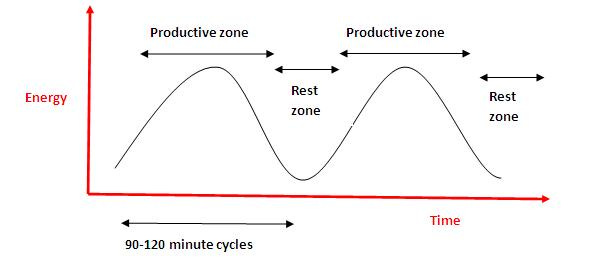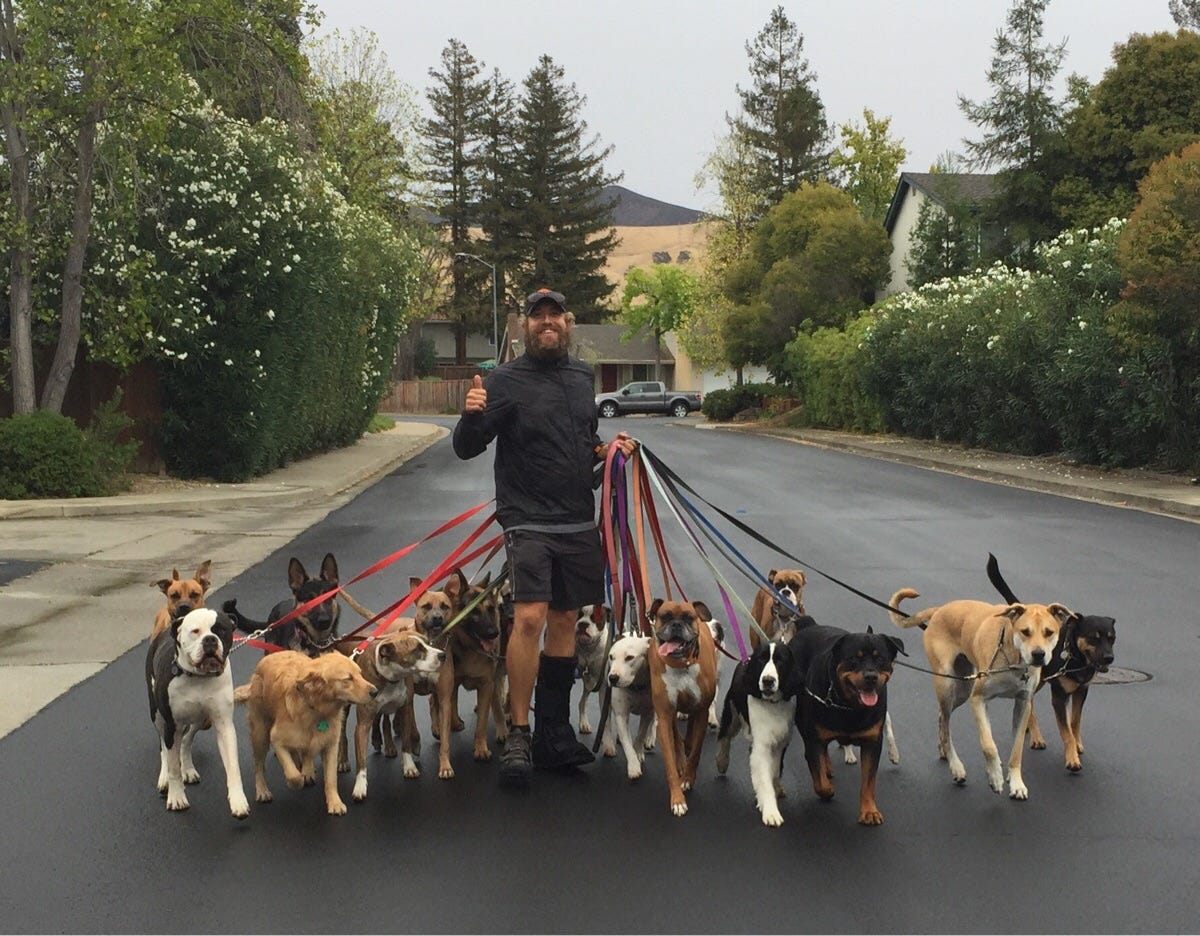💥 How to Manage Your Energy - Issue 06
I’m Brian and each week I publish content on personal growth. Sometimes it will be things I’ve learned in my own growth experience, but most times I’ll be answering readers’ questions about personal growth. Send me your questions, and in turn, I’ll do some research & interviews and humbly offer the best advice I find.
If you find this newsletter valuable, consider sharing it with friends, or subscribe if you haven’t already. 👇
Q: I hear some entrepreneurs and investors talk about managing their energy instead of their time. What does it mean to manage your energy?
I love that this question came up because I’ve heard this advice being kicked around a bit. What I’ve found is that it’s mostly been advice without a deeper dive into what it means to manage energy.
Meaning I think there is more advice about managing the energy than solid steps on how to do so in a way that doesn’t overwhelm you even more. Here’s a solid example from Harvard Business Review that was sketched out by Hayley Lewis. It’s great… and can feel like a lot to take on.

What is clear is that there is evidence that managing your energy is incredibly productive. The argument around why you would want to manage your energy is based on the research that managing your energy will:
Produce higher quality results given the same amount of time 👍
Increase your overall happiness and satisfaction in life 😄
Result in more free time than if you focused on managing your time alone ⛳️
The first thing we should jump into is how managing your time and your energy are not the same thing.
Time vs Energy
Time is a finite resource. It only runs in one direction, forward. It also runs at one pace for everyone: you get 24-hours in a day. So even if you are in the top 1% of the world in terms of time management, you’re working with the same fixed resource constraint as everyone else.
(Note: Scientifically there are ways to slow time down, but you’d need a black hole for that and this is not a newsletter about astrophysics. You can watch Interstellar for a realistic crash course in that. )
Energy is a different story. Energy is your capacity to work, and your capacity to work isn’t bound by time. You can put 1 unit of energy into an hour of effort, or more than 1 unit of energy into an hour of effort. The result of the hour of effort will be driven by the amount of energy I put into it.
An easy place to see where this happens is exercise because calories are units of energy. Let’s say my goal was to burn 300 calories today from jogging; I can hit that goal in 30-minutes.
If I chose to Kickbox instead of run today, though, I would burn 300 calories in just 20 minutes. In a 30-minute Kickboxing workout, I’d end up burning a total of 450 calories. With the same time constraint, I can accomplish 1.5x more if I pump more physical energy (calories) into the activity.

Mental energy and productivity are very similar. Time management is my ability to set aside time for certain things. Energy management is about how much energy I can bring into that time block. Given a set amount of time, my ability to maintain a higher level of energy within that time-frame will produce a higher output.

To the extent that I can bring more focused, undistracted mental and emotional energy to a time block, the more I will get done. I might find that I will produce more within a time block or that I will just need less time.
What makes this incredibly challenging are the life demands on us that deplete our mental energy before we can even focus on a task we want to accomplish.
What happens when my mental energy is low?
Never in human history have the demands on your mental and emotional energy been so high. This is a non-exhaustive list of the things pulling for your energy throughout a given workday:
The demands of your job or business 🏢
Building and maintaining your personal brand 🥇
Keeping up with new developments (i.e who’s running for president) 📰
Your close and loose relationships 👩❤️👨
Your kids 👨👩👦👦
Whatever new show is on Netflix 🎬
It’s not just the number of things we have to manage, but the caliber & quality at which people expect us to manage them. It’s more inputs than your brain can handle at one time.
When you’re faced with having to manage so much, you can develop a cousin to ADD called Attention Deficit Trait (ADT). ADT happens when the number of overwhelming tasks you’re facing triggers your nervous system into survival mode. ADT has a lot of the same traits as ADD, such as distractibility, impatience, difficulty managing priorities, and procrastination.
Similar to trying to fend off a physical attack, your mind and body will do whatever it can as quickly as possible to get out of survival mode, which means you start operating from fight or flight.
Here are some of the things that are more likely to happen when your energy drops and ADT kicks in:
You will make more impulsive judgments
Your sense of humor and flexibility decrease
The likelihood that you’ll lash out in anger or frustration increases
Your creativity plummets and you complete subpar work
A challenging thing that COVID presents is that people are more likely to suffer from ADT when they work in physical isolation from others than when they work in close physical contact with others. Most of us are working from home now, in isolation from co-workers. Have you been feeling more overwhelmed lately?
I’m not an expert on ADT. If you’re interested, you can read an article about it here.
But, seeing as the number of hours in a day isn’t going to increase from 24 anytime soon and it doesn’t seem like life is going to reduce the number of inputs you have to manage, managing your energy is the best approach you can take.
I did a bunch of research and combed through a plethora of tips and here are a few ways to actionably better manage your energy today, in the world of work-from-home.
I did not include exercise explicitly, even though that would be number one on the list. There’s so much research on exercise and the benefits of it. If you’re not doing it, I don’t think another list is going to convince you. So, this list is a bunch of other stuff you can do, which don’t replace exercise, but they are impactful in their own right.
I also encourage you not to go trying them all at the same time. Try one or two, then add more later if you feel like you can handle it without driving more overwhelm.
1. Schedule your breaks or they’ll happen too late
There is hefty research that our minds and bodies operate on 90-120 minute cycles called “ultradian rhythms.” This is a cycle where your body moves from a high-energy, incredibly productive state to a psychological trough. After that 90-120 minute mark, your productivity declines precipitously.

Once your energy is depleted, you would be better off doing nothing for a minute than doing anything related to that task for an additional minute.
This is getting worse in the age of work-from-home because we tend to move from task to zoom meeting, back to a task, then onto another zoom meeting.
If you can schedule even a 5-10 minute break to do anything other than work, you’d be more productive.
When I say anything, I pretty much mean anything. Play the guitar, watch a youtube video, tickle your kid, pet your dog, clean the cat litter, etc. Just stop working for a few minutes.
2. Put your body on the move more often
You might have noticed that I didn’t say “exercise” because, again, if you’re not doing it, you’re not going to start because of this list.
Way back in the day when we used to work in offices (it feels like years ago doesn’t it), you would have these natural energy resets where you would move your body around the office space. Maybe you’d go get a cup of water from the kitchen, walk to the restroom, or walk to a conference room.
Those were energy resets built into the workspace that boost your energy back up. Your adrenaline started pumping just a bit from moving your body and you were able to channel that energy into your work or meeting.
But now, you’re on Zoom all friggin’ day for your meetings and you walk 15-feet to get water. Your energy resets probably aren’t what they used to be because no one is forcing those resets anymore. It’s going to be up to you to replace those natural energy resets that we’re not getting as naturally at home.
Here are some examples of things you can try:
🚶♂️Take your meeting on the move. Call someone instead of “zooming” them and take the meeting while walking around your neighborhood. They’ll get a better version of you and you get some vitamin D.
🤸 Jump around before your meetings. If you’ve done a zoom with me, you know I challenge people to move their bodies before or during meetings. Even 20 jumping jacks will do. No one falls asleep on my watch!
🦮 Fire your dog walker. Walking your dog would be an amazing emotional and physical reset. Stop outsourcing your energy reset.

3. Batch your energy
I’m a huge fan of batching and I’ll probably do a much longer article about this later, so I won’t get too deep into it here. But, this came up in so many materials that I have to mention it here. To the extent that you can reduce distractions when you’re working on important things, your productivity shoots through the roof.
Whatever you’re working on will take less time when you can pump more focused energy into it.
A distraction is anything that takes away from the task at hand. If it’s important, and you can’t outsource it, you should batch it and knock it out in its own time block. This would mean that outside of that time block, you’re not touching it at all. Pick the task up when you can give it your full energy.
Here are some things you can try batching if you haven’t already:
📧 When you respond to emails and text messages. You’ll start to notice that you get through them more quickly when you do them all at once.
🌄 When you’ll use social media. This is a massive productivity killer because of how social media makes you feel. Big energy suck here.
👫 When you’ll use dating apps or invest in dating. Dating apps are like gambling and triggers many of the same energy highs and lows.
💙 Relationship time, so that you can give uninterrupted attention to those you care most about.
4. Go to sleep, even in the middle of the day
Kobe Bryant is one of the best athletes of all time. One thing about him that people remember is that he would work out 4-times a day to get better at his craft. His theory was that if he practiced twice as much as everyone else, they wouldn’t be able to catch up to his skill level.
But he didn’t always do that. He would listen to his body and invest in his energy appropriately:
“Sometimes… I’d be so tired I’d need a quick nap at some point during the day. Whether before practice or a Finals game, on the bus or trainer’s table, five hours before a tip or 60 minutes, if I was tired I would doze off. I always found that short 15-minute catnaps gave me all the energy I’d need for peak performance.”
- Kobe Bryant
There it is. One of the hardest working guys in sports saying he would take naps.
It’s really important to invest in your physical energy and give your body what’s it’s asking for. Sometimes that will mean putting down whatever you’re working on, getting some sleep, and picking it back up when you’re more energized.

5. Stop drinking during the week
I like to drink socially, so I will be the last person to tell you to stop drinking altogether. But there is a lot of research on the impact that alcohol has on your brain cells. Very quickly I’ll just tell ya that it kills brain cells. True story.
When you drink too much, you kill brain cells and accelerate your development of memory loss. This is memory capacity that you probably want to apply towards whatever your goals are.
But for the sake of your personal energy, drinking reduces the quality of your sleep, which will flare up the ADT we talked about earlier. So if you can cut your alcohol intake during the week, you can improve your sleep and reduce your stress. It seems like a worthwhile tradeoff.
6. Top Tip: Work on things that you deeply care about
I saved the best for last. Aside from exercise, the thing you can do that will have the biggest impact on your energy state is working on something you actually care about.
What’s interesting is that all the tips above have an ability to make you more efficient at doing things you don’t care about. This is the one that requires that you do some emotional diving.
People tend to ignore this one because it can feel a little more spiritual in nature. But, you tap into a massive energy source when your everyday work and activities are consistent with what you value most and what gives you a sense of meaning and purpose.
“What are examples of when you’ve found yourself feeling effective, effortlessly absorbed, inspired, and fulfilled? Is there a way for you to do more of that work?”
Most of us live at such a furious pace that we rarely pause to ask ourselves what we stand for and what we truly value out of life. Who do you want to be? Are you on a path to becoming that person?
When that answer is clear and you’re working towards that, work won’t feel like work anymore.
This is a reminder that sits on my computer thanks to a sticker I got from my friend Justine. It reminds me of this energy management tip and how impactful it can be.

What works for me personally?
There are plenty of times when what I was doing felt like work. Now isn’t one of them.
The things I do today are more physically taxing than any work I’ve ever done, and yet I feel so much more energized because I care about what I’m doing. It’s my sweet spot and I feel fortunate to have found it.
I just wanted to drive that home again because I do feel it’s more impactful than any other tactics I’ve mentioned in this article. But for some reason, most of us will reach for the tactic rather than taking the deeper cut at who we want to be. The first thing I’ve found impactful is doing something that makes my heart sing.
Here are other things I practice to manage my energy:
📱 My phone is on airplane mode when I sleep or when I need to focus on things that require a high amount of attention (like this newsletter or when I facilitate a workshop)
📅 You can’t book a meeting with me on Wednesday or Friday. It’s blocked out on my calendar and I make very few exceptions.
🐦 I batch my emails and social media.
🥞 I cook the same thing for breakfast and lunch every day. It takes zero energy, zero thought, and I tend to call people while I cook, so it doubles as connection time.
📖 I track how often I do things that give me energy, like playing guitar, meditating, reading, and connecting with friends. I can tie that back to my stress level.
Challege of the Week: Choose a tip that will help you better manage your energy and implement just one of them this week.
Other things you might inspire you this week:
This post shows how to be firm, supportive, and loving at the same time.
I’m doing a 4-week course on relationships in partnership with Sail.
I’m launching a bunch of video content on Instagram over the next few weeks. Here is a WIP preview. I’m open to feedback and video requests.
That’s it for this week! Hit me up if you have any thoughts, feedback, or insights to share.
If you found this valuable, consider sharing it with friends, or subscribing if you aren’t already.
Cheers!
Brian ✊



